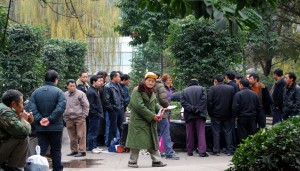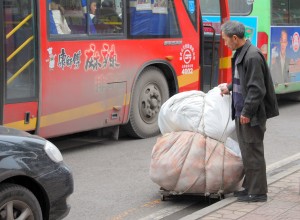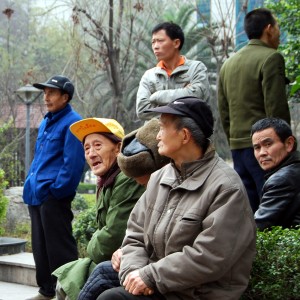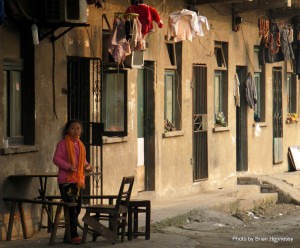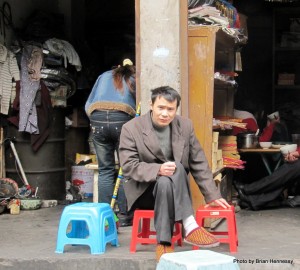Qiongren: the poor people.
Brian Hennessy. China Australia Consult. February, 2009
China's Qiongren: the aged, farmers, laid-off workers, the mentally-ill, migrant workers, peasants, and the uneducated. 800 million of them. Stoic and tough survivors of both communist and capitalist economic policies and promises; natural disasters (usually drought and flood, but last year an earthquake also), and life itself.
Qiongren: the poor people
______________________________________________________________
Look at their faces: no emotion. Look into their eyes: no light. Look into their hearts: no hope. Just survival, that is enough. A better life? Tell me another one. A future? More of the same.
How do they do it? This is all they have known. There is no change, no expectation of change, and no hope of change. They have never known anything different, and they don't know any better. Proud, independent people, living lives that would drive us soft westerners to despair. Yet they carry on because they have to. Nobody else will help them. And there are too many of them to help anyway.
Where would you begin, and what difference could you hope to make?
Life is hard. The education system favours the rich. Likewise, the health system. Everything in China costs money. Everything. Some of their housing is an insult to humanity (despite the gleaming new apartment complexes which surround them in the big cities). Sure there has been some tax relief. A little for a few. A lifting of the tax-threshold for farmers, but none for the 200 million migrant workers who are building modern China brick-by-brick, who sleep on a rattan mat under a crude shelter on a building site, and who live on a humble diet of rice and green vegetables. Their cheap labour enriches others.
Sure, the central government has passed a law which will allow some private property for farmers, but if history is any guide to what will happen next, these honest toilers will find that they have been ripped-off again. Local County authorities are a law unto themselves, and they control everything: from births to taxes. They employ the cops, administer the law, and suppress any dissent. Sometimes violently.
The central government is sincere in what it is trying to do for its people, and I sympathise with the difficulties it faces: the problems are many, and they are huge. Lifting so many people out of poverty has to be one of history's greatest humanitarian tasks. Who cares whether it is done democratically or not. That kind of politics is a luxury which China cannot afford at this stage of its journey from an undeveloped agrarian economy to developed nation status – later, perhaps. Basic needs must be met first. The political rights of individuals will come later when bellies are full, and there is social security, and universal education and health-care.
Sure there is corruption. Every developing country has it: from Africa to Indonesia, from Russia to India, from Central to South America. But tackling this cancer seriously would entail some cost, for example: (i) a redirection of government effort during this critical period in China's development; and (ii) the potential loss of so much administrative talent (to the firing-squads and the jails). It is that endemic. The system is riddled with it.
Further, such a task would also demand unity of purpose from a leadership group which represents many competing interests and forces within Chinese society. The fact is, a serious anti-corruption drive is not an option during this phase of development. This will come later.
Despite carefully constructed appearances, President Hu Jintau does not lead a compliant body of ministers and legislators. Like governments elsewhere around the world, he must deal with hawks, doves, and factionalism. Factions include, for example; the development-at-any-cost “Shanghai clique” of ex-president Jiang Zemin; the conservative Military and Police, and the more progressive group led by Hu Jintau and his deputy Premier Wen Jiabao.
Although the government is a totalitarian regime, the President's authority is not total. He is a committee man, and his power is limited. Western views of China as a fiery dragon with an appetite for raw power are inaccurate. In fact, consensus, compromise, and caution underlie all decision-making in China.
Once a decision has been made, however, the totalitarian authority of government ensures that important policies are implemented quickly. For example: the recent infrastructure stimulus package in response to the world economic downturn. The government can, and does, tell the banks what to do. The Party, with its representatives on the board of every major corporation in China, does likewise. When the Party or the government says jump: everybody jumps.
Except, maybe, those cadre down at the local county level, on the outer-limits of centralised power and responsibility. A corrupt or self-serving local elite can get away with a lot. They can lie to the central government about many things. For example; how the budget for last year's flood mitigation was spent; or how many people drowned this year as a result of leaking budgets. There is no auditing, no accountability, and no transparency.
Too many of these capitalist communists are county barons.
Feudal.

